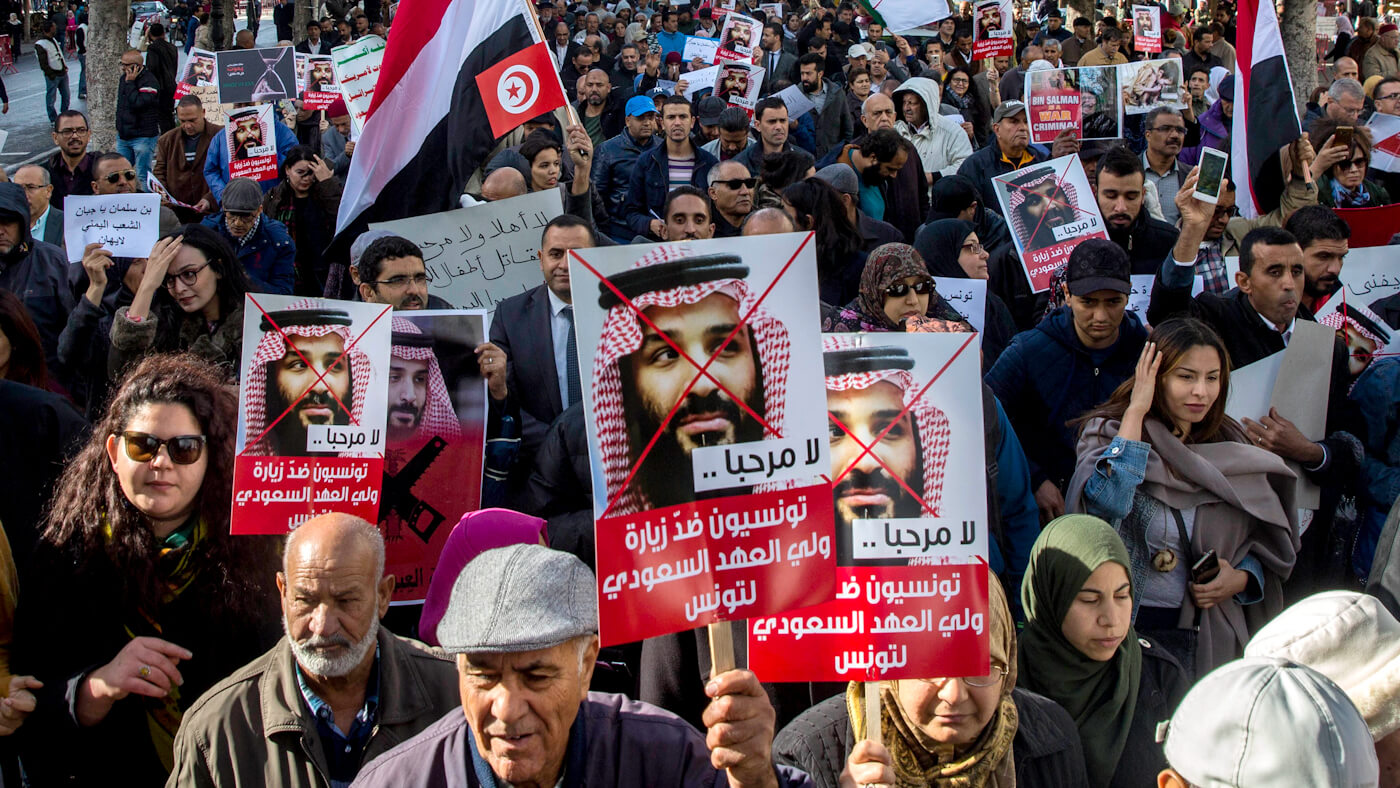TUNIS, TUNISIA — Hundreds of Tunisians took to the streets this week to protest a visit from the murderous Saudi Arabian crown prince, Mohammed bin Salman (MBS). Users on social media quickly spread photos of the demonstrations, as they were the first of their kind in the Arab world. This is an unusual turn of events for MBS, who faces no opposition at home and is generally welcomed with extravagant diplomatic decadence wherever he travels. Although Mohammed bin Salman has faced protestors in the United Kingdom, the United States, and Europe, these protests of Tunisia are the first of their kind in the Arab world.
Giant wall poster of Saudi Crown Prince MSB holding a chainsaw across : “No to the desecration of the land of #Tunisia, the revolution”. Tomorrow’s press conference of Tunisia|n NGOs will be held here. pic.twitter.com/VhlfWSgd12
— Med Dhia Hammami – محمد ضياء الهمامي (@MedDhiaH) November 25, 2018
Marches in #Tunis ahead of MBS’s visit. Chants include calling for the “salvation of #Yemen” and “Tunisia is free, MBS go away”
It’s no mistake that the only #Arab Spring #democracy is the one where people are protesting #MBS
Kudos to #Tunisia! This is what democracy looks like pic.twitter.com/K01GHZZcNW
— Ines (@InesMurad) November 27, 2018
Protesters gathered for two consecutive days on Habib Bourguiba Avenue in downtown Tunis to display their disdain for the suspected war criminal, who was scheduled to meet with Tunisian President Beji Caid. This is MBS’s first stop on his first trip abroad following the killing of Saudi national and Washington Post journalist Jamal Khashoggi in October.
“I was here yesterday and I came here again to say ‘No’ to the murderer and criminal, Mohammed bin Salman,” Said Arous, a human-rights activist, told Al Jazeera.
Although the killing of Khashoggi was a driving factor behind the protests, many demonstrators lambasted MBS for his monarchy’s nearly four-year brutal war against the Republic of Yemen, a campaign known to have been planned and championed by the crown prince himself. Over 37,000 have been killed or injured since Saudi Arabia launched its airstrike campaign and subsequent blockade of the impoverished Arabian country, according to Yemen’s Legal Center for Rights and Development.
After a welcome from President Caid at the airport, MBS and the Tunisian president attended talks together at Carthage Palace. Only approved photographers were allowed to cover the visit owing to the angry backlash from the Tunisian people. The visit reportedly lasted only four hours.
#Saudi crown prince has left #Tunisia. The visit only lasted 4 hours.
— Bassam Bounenni (@bbounenni) November 27, 2018
Bin Salaman Ends His Visit to Tunisia Following Massive Demonstrations #Tunisia #Unews pic.twitter.com/6M50rCEJ3p
— Unews Press Agency (@UnewsAgency) November 28, 2018
Protesters were adamant and specific about their concerns with MBS, making it clear that they were not demonstrating in support of Qatar or Turkey against Saudi Arabia but rather to highlight the Tunisian people’s dignity in the face of the murderous Saudi regime. In fact, many protesters proudly displayed the slogan of Yemen’s Ansar Allah (Houthi) resistance movement in support of the Yemeni revolution.
The Great Revolutionary People of Tunisia stands in unconditional solidarity with the Revolutionary People of Yemen.
Thank you, Tunisia. pic.twitter.com/lMPRhEMvSM
— روني (@agerhusmedia) November 26, 2018
“We are not here to support the Qatari-Turkey axis over the UAE-Saudi Arabia axis,” Arous said to Al Jazeera.
#SaudiCrownPrince Mohammed bin Salman arrives in #Tunisia #SaudiArabia #binSalman pic.twitter.com/ulFQtcF2TR
— UnReported (@UnreportedSaudi) November 27, 2018
Reasons for Tunisian rage

Tunisians protest Mohammed bin Salman with signs reading ‘You are not welcomed’ Nov.27, 2018 in Tunis. Hassene Dridi | AP
Tunisians have a great deal to be angry about with regard to Saudi Arabia. In 2011, Riyadh granted asylum to former Tunisian President Zine Ben Ali, following his ouster after the popular Arab Spring protests.
In addition, Saudi Arabia’s official state religion, Wahhabism, which is known to promote terrorism and intolerance, has begun to infect Tunisian society. In 2016, the Tunisian prime minister fired the minister of religious affairs, Salem Abd El Jalil, after El Jalil dared to point the finger at Saudi Wahhabism for contributing to “terror and extremism.” It’s worth mentioning that more fighters in the Islamic State have come from Tunisia than anywhere else and residents fear blowback.
Although Tunisia is not an official participant in the Saudi-led war against Yemen, the North African country has received hefty aid packages from Riyadh, including $800 million in loans from the Saudi monarchy in 2016.
The protests in Tunisia, as well as the widespread support across social media, came as the Saudi crown prince prepared to leave for Argentina to attend the coming G20 summit. MBS arrived in Buenos Aires on Wednesday for a tense meeting with world leaders, which begins on Friday. Many leaders are expected to refuse the Saudi leader’s handshake in light of the Khashoggi scandal and Saudi war on Yemen.
Top Photo | Tunisians protest with saws Nov.27, 2018 in Tunis. Amid international outrage over the killing of Saudi journalist Jamal Khashoggi, protesters gathered in central Tunis to protest the prince’s Tuesday arrival for talks with the Tunisian president. Hassene Dridi | AP
Randi Nord is a MintPress News staff writer. She is also co-founder of Geopolitics Alert where she covers U.S. foreign policy in the Middle East with a special focus on Yemen.
The post In First Venture from Home Since Khashoggi Killing, MBS Is Greeted by Angry Tunisian Protesters appeared first on MintPress News.
